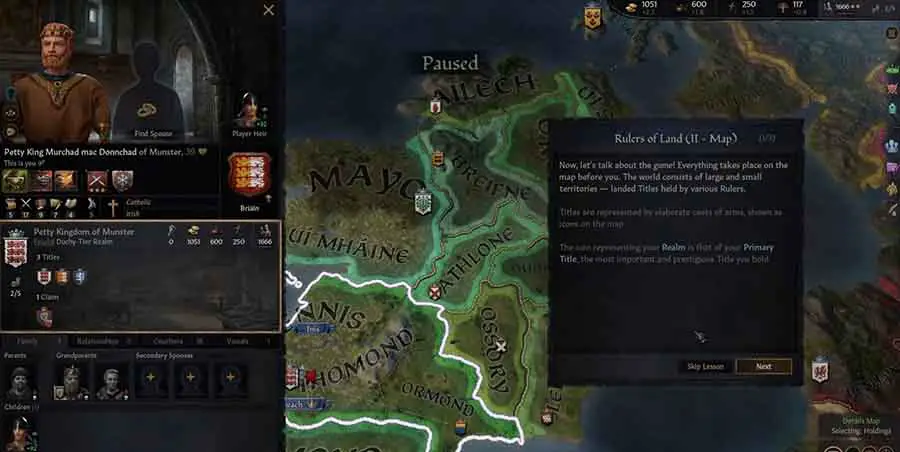
Crusader Kings 3 is a grand strategy role playing game from Paradox. Like most games from this game studio, it is both deep and complex. It has a lot of systems that interact with each other and decisions you make will affect you and your family for generations to come. But is this a good game for a beginner to start with?
Crusader Kings 3 is not a good game for a beginner. It is essentially a role-playing game that, overall, has little resemblance to a classic strategy game. If new to this genre it would be better to start with a game like Civilization 6, Stellaris or Hearts of Iron IV.
Don’t get me wrong, this is a great game, but one I would not want to tackle as a beginning strategy gamer. I’ve played a lot of strategy and grand strategy games and still found this one difficult to learn, and honestly, it is still one I have yet to master. It has game systems, like titles and marriages, that you don’t find in a typical strategy game.
CK3 Titles Are What Is The Most Confusing To A Newcomer
I found the Titles in the game to be the most confusing and very difficult to keep straight, even with the tooltips. A Title is basically a “certificate of land ownership” and there are 5 different sizes. The smallest is the Barony and the largest is an Empire. There isn’t always a ruler for these parcels of land but Titles for them can be created by a Ruler who controls enough of the territory.
Take Kingdoms for example. You can create that title for yourself (King of Ireland for example) once you control enough counties, even if you don’t control all the territory.
Not too complex until you add in De Jure Titles and add to that the fact that some names are the same as others, like a Petty Kingdom is actually a Duchy. This understandably adds flavor to the game but to a newcomer like me it only makes the game more confusing and difficult to learn.
The De Jure is the most confusing to me out of all the titles, which is a “title by law.” What this means is that there will be multiple titles that belong to a certain kingdom legally (De Jure) but you may not own all of them even though you are the legal Ruler of that kingdom. In other words, it’s yours but you may not actually control it, you’ve just laid claim to it.
Another thing is that although something like a Kingdom might exist the title for it might not. I can use the tutorial as an example. Although I’m the Ruler of the Petty Kingdom of Munster (a Duchy) the title for the Kingdom of Ireland does not exist, I need to have two Duchy titles before I can create it but currently only have one. Guess I need to go out and acquire another one quickly?
For that I need a claim first. So, if I want to gain Ossery, which is next to me, I need a claim against it but don’t have one. If I do acquire it that should get me closer to having enough titles to create the title for the Kingdom of Ireland. I’ve asked my Bishop to fabricate a claim on Ossery, which should be ready in 18 months.
Fabricating the claim worked in this game and conquering the county wasn’t too hard but I only have 6 out of 8 counties needed to create a kingdom title, which is a different requirement than having two Duchy titles. So maybe Leinster should be next? But is that a county? Or a Duchey?
That’s why I consider this game complicated and hard to learn. I find myself continually consulting help files to try and understand everything. I know most of it is due to my inexperience and as I play the game more, I’ll begin to understand everything a little better, but I’m still finding it tough.
Marriages Are A Unique System
Marriages are also confusing to me and are not analogous to any other game system I have experienced, although it was one of the main methods used to create alliances in past ages and in this game. I’m not exactly sure why a particular marriage is relevant, but there is an entire dropdown list to order the candidates with and to choose attributes from. This is more of a strategy portion of the game than anything else and depends on your overall strategy when it comes to choosing a spouse. Since I like alliances early in the game, I usually use alliance power most of the time to choose my spouses with. Allies come in handy when conquering some of your more powerful neighbors.
Research Is Different
Unlike most strategy games, research does not play a significant role in this game, and you really don’t have much control over it, plus it is slow. You can’t do things like dedicate more “scientists” to research things or build more research facilities, simply because they don’t exist in this game. Researching things like Battlements takes close to 400 years.
The only way to speed up research on anything is if your Cultural Leader becomes fascinated in something like Chronicle Writing, which can give a speed boost of around 25%.
Research is dependent on your culture and has three areas, Military, Civic and Cultural and Regional. More options unlock as you progress through the ages.
The Character Is The Main Game Focus, Not The Empire
The lead character is the main influencer for your Realm, unlike other games where they tend to sit on the sidelines a little more. Although a leader can be shaped by a Lifestyle, his traits, skills and family are basically set at the start of the game and play heavily into the game, much more than for a typical strategy game.
Conclusion
Don’t forget to visit my YouTube channel at https://www.youtube.com/channel/UCcWU6qxVisK93h5guKRVtdg
This a great game, especially if you like roleplaying. I find myself drawn into it more and more as I learn it, but in my humble opinion, it’s not a good one to start with as a beginner in the strategy game genre.
